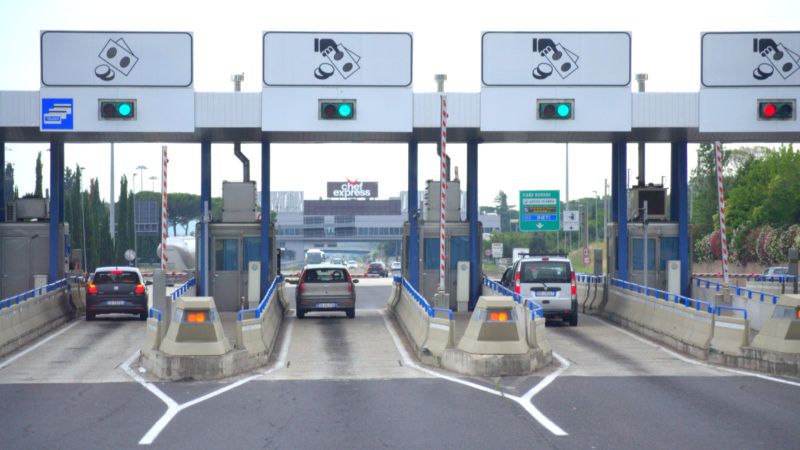Coronavirus Is Devastating State Budgets. Is Leasing Toll Roads to Private Operators the Answer?
Leasing state toll roads could provide the revenue states need to improve their balance sheets.

The economic toll of COVID-19 has left state governments short on revenue, prompting policymakers to mull tax increases and hope like hell for another federal bailout. At the same time, the pandemic has done nothing to reduce states' longer-term needs for funding their pension systems, servicing their debts, and maintaining infrastructure.
One possible way to strengthen states' balance sheets would be to lease state-owned toll roads to investors, who could offer a near-term infusion of cash in exchange for the right to collect the tolls currently being paid to state tolling agencies.
"Despite the pandemic and recession, car usage is nearly back to normal levels in many areas," says Robert Poole, director of transportation at the Reason Foundation (which publishes this website). "There continues to be great interest in long-term investing in U.S. toll roads. With today's low interest rates, these types of acquisitions are still attractive to global toll road companies, infrastructure investment funds, and pension funds."
A new Reason Foundation study authored by Poole looks at nine major state-owned and -operated toll road systems. It finds that long-term leases of these roads could bring in anywhere from $1.1 billion (in Kansas) to $19.4 billion (in Illinois).
The pandemic has created both dangers and opportunities for toll road investors. Early in the crisis, declining traffic volumes saw Moody's downgrade the expected bond ratings of several European toll roads from stable to negative. In other words, they anticipate that those bond ratings will fall in the future.
The easing of lockdown orders, and the rebound in vehicular travel, have seen Moody's rate the outlook for other toll roads' bond ratings as stable. Pension funds and private toll road operators have also either increased their investment in toll road leases or expressed a willingness to do so in the near future. Low interest rates and the financial distress of current toll road operators make this a good time to invest, according to the Reason study.
States are facing a collective $500 billion budget shortfall over the next two fiscal years, according to an analysis from Moody's Analytics. The Coronavirus Aid, Relief, and Economic Security Act, passed in March, created a $150 billion relief fund that states, territories, and localities could tap to pay for increased expenses related to the pandemic.
Democrats have proposed an additional $1 trillion in bailout funds for states and localities. Republicans say they'd like to keep the additional aid to $150 billion.
Often investors will make an upfront lump-sum payment to governments for a toll road lease. Using that one-time windfall to plug short-term budget gaps would be unwise, the Reason study argues. It could avert some of the short-term cuts to programs and staff, but it would do nothing to alleviate states' longer-term obligations while leaving them without the toll revenues they could normally expect.
Instead, Poole recommends that states use that money to pay down longer-term liabilities, particularly unfunded pension obligations.
Most state pension systems were already underfunded before the crisis. The pandemic hasn't helped matters. "With some investment returns likely declining by as much as 15 percent this year, thanks to the COVID-19 pandemic, states are going to face a cumulative pension debt of between $1.5 trillion and $2 trillion by the end of the year," wrote Reason's Eric Boehm in April.
Leasing state-owned toll roads could cover anywhere from a paltry 5 percent of unfunded pension liabilities, in the case of Ohio, to around half of Florida and Oklahoma's unfunded pension obligations.
Pensions aren't the only way states could use the proceeds from leasing toll roads to improve their balance sheets. Chicago used the money it earned from leasing out its Skyway toll road to pay down debt. When Indiana leased its toll road system, it used the proceeds to pay for infrastructure improvements.
In addition to putting states' balance sheets in better shape, leasing toll roads to private operators could ensure these roads are managed more professionally. Leasing contracts can include specific performance targets and a state of repair that toll road operators have to meet. Private management would also guard against the politicization that often befalls state tolling agencies.
Leasing of toll roads to private operators is a common practice in Europe, Asia, Latin America, and Australia. But so far, the U.S. has been pretty resistant to this trend.
The coronavirus pandemic has upended all manner of senseless regulations and ways of doing business. Perhaps it offers an opportunity to improve how we manage our roadways too.
Rent Free is a weekly newsletter from Christian Britschgi on urbanism and the fight for less regulation, more housing, more property rights, and more freedom in America's cities.


Show Comments (84)